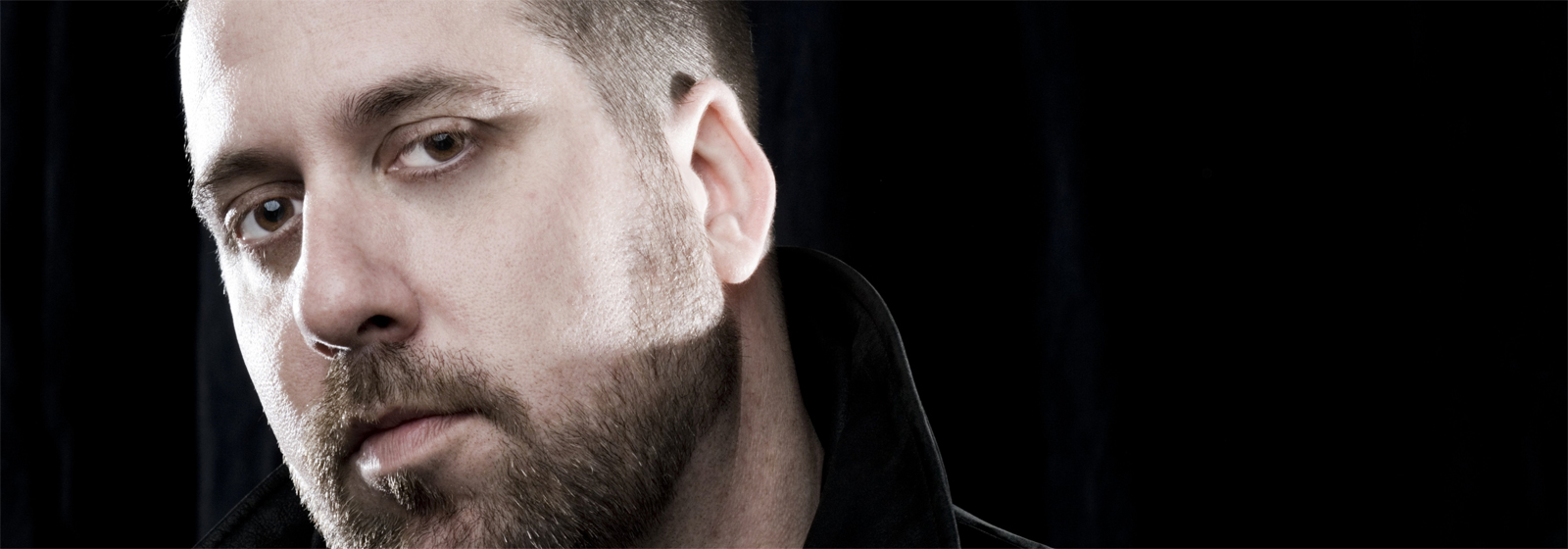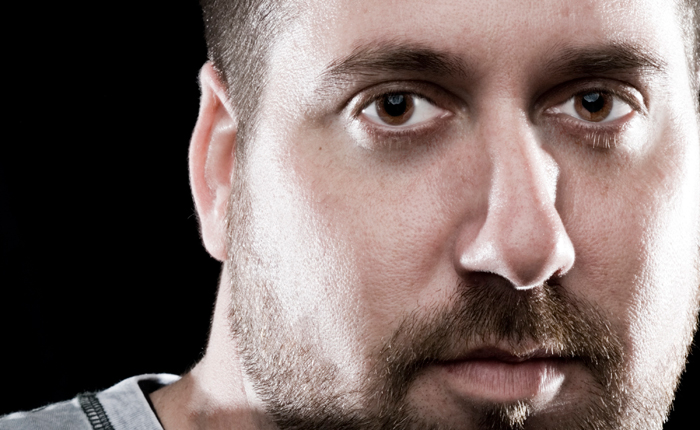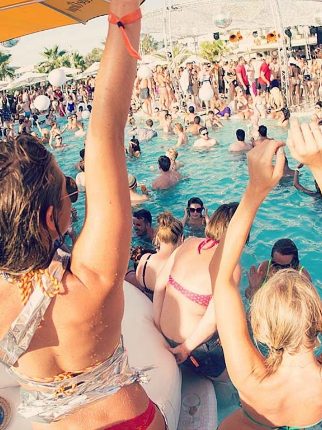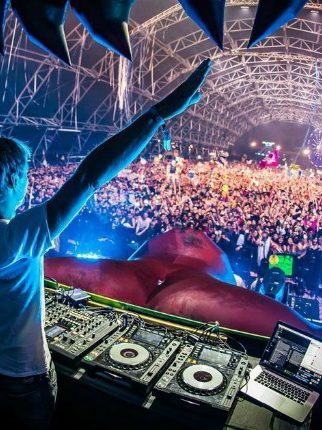AK1200’s True Dedication to Drum & Bass

It is safe to say that AK1200 is an artist to be admired, not only for his skills, but also for exhibiting a true dedication to the drum & bass scene—each and every aspect of the scene. Since arriving as a DJ in the late ’80s, AK1200 (born Dave Minner) finds it imperative to keep the drum & bass fire strong by promoting his fellow artists on the street or through social media. He continues to assist upcoming and established artists on his successful label, Big Riddim Recordings, and stays strong with the Planet of the Drums crew, whom you can catch at EDC Orlando in November. When he’s playing live at a club in an area lacking junglists, he works twice as hard to ensure that when that promoter throws another party, the crowd will be doubled. “This whole community is a very nurturing one,” he says. “We all look out for each other.” We caught up with Dave after his appearance at the Big Dub festival in
Artemas, Pennsylvania, to get an update on the current state of drum & bass, the misconceptions about the genre and its fans, and what it takes to stay in the game for so long.
What made Big Dub a great festival? What advice do you have for promoters?
I’m definitely not knocking any other festival I’ve played at, but anyone that does a show with that magnitude of people has to be responsible for thousands of people and their well-being. They have to have plenty of resources like security, first-aid, plenty of water, and shelter for bad weather. With good security, people feel safe. I think that some promoters worry about their artists too much and focus on that first, when the attendees should be the priority.
I’ve never taken a hiatus or switched genres to reinvent myself. I’ve remained true to the one scene of music that I was passionate about.

You are the longest-running drum & bass DJ in America. Are you in the Guinness Book of World Records?
(Laughs) I should be, I guess. When I first started Djing in ’89, there were the roots of what was to become jungle and drum & bass. That’s when the music started changing, around ’91. There was the breakbeat stuff that turned into the hardcore breakbeat, jungle, techno and rave. I followed that sound and became known for that sound as it progressed. I’ve never taken a hiatus or switched genres to reinvent myself. I’ve remained true to the one scene of music that I was passionate about. It’s never been about being a DJ, it’s been about the music I play. It’s not a selfish thing, it’s about the music I represent. There may be a couple people who have DJed as long as I, but they have not done as much as I have done.
Why do you love drum & bass so much?
Before jungle and drum & bass came along, it was sort of this wild-style mentality, where these kids were coming in with these hip-hop samples and [different] types of breaks—this sort of urban vibe. I was traveling to England a lot [between] ’92 and ’95. There was this code of conduct. It had separated itself. It was basically the black sheep of dance music. It was a group of people who didn’t want to be part of the cool thing. I’ve always felt a bond with it. It’s always been about expression of artistic quality. The tempo is so much faster than any other type of music, that we isolated ourselves from mainstream dance music—not on purpose, but for our own sense of belonging. It became other people’s perception that we have an elitist mentality, but that’s really not the case. Drum & bass people are the most loyal and critical. They keep me in check. I’ve been called more names that I can count, like I’m the “Neil Diamond of drum & bass.” People who I fight everyday to represent will call me out in a second. I really wouldn’t have it any other way.
What’s key to maintaining such a long DJ career?
People need to realize that they are lucky to be where they are, and at any given moment their fans can stop supporting them and their career is over. It’s important to connect with people.
There’s too much ego-feeding and too much disrespect nowadays. Let’s say hypothetically—well actually, it’s reality—someone did a bootleg of a Goldie track. So Goldie went and kicked him down a flight of stairs. Nowadays you got these kids who are disrespecting other artists, and it’s getting out of hand. Promoters are letting it get out of hand. They need to learn where we [longtime artists] come from.
Do you remember the moment you realized that you wanted to DJ?
I started going to clubs before I had turned 18 in 1989. Back then, we mostly listened to new wave, which turned to industrial, then onto acid house. Once I was 18, I started going to a club called Aahz, and at 2am in this big, dark room full of people, a voice would come on saying, “Welcome to late night.” It was Kimball Collins. Back then, you couldn’t see where the DJ was unless you knew where to look, and you certainly didn’t know what they were doing. One night, I heard him scratching with a “Just Feel It” sample, and I thought to myself, “I can do this.” From that moment, I knew I would become a DJ. Standing in the club, seeing the power that this voice had over people, there was no care to who was playing; it was the music that mattered—what was coming out of the speakers.
What are your favorite styles of drum & bass and jungle to play?
People who don’t listen to drum & bass are going to say it all sounds the same, but depending on what part of the country you are in or what type of club you are at, you play accordingly. At the festival last weekend, where there are thousands of people, I played a bit more commercial stuff. Before that, I was in Nashville playing to an old-school crowd, so I took them on a trip down memory lane. I’m known for hard, rolling, techy funky stuff. I don’t play a lot of ragga jungle or anything. I don’t play a lot of liquid or jump-up. I play what the crowd wants. I’m like the guy who will go to an area and a club that is not known for loving drum & bass and help out the promoter by playing a great night and leaving there knowing that they can throw another drum & bass party with more of a crowd.
Who are your favorite artists right now?
I love Gridlok. If there is anyone who has devoted themselves to drum & bass, it’s him. He sets an exceptional standard for drum & bass in America. Everything he does is top quality. His music is on so many labels, [and] he has reached every accomplishment that anyone can do in the drum & bass field. He deserves so much more credit than he gets. My sets depend on his music. Aside from Gridlok, there’s Mob Tactics, who have an EP that just came out. They are someone to watch. I like Noisia; they have set the standard for modern day electronic dance music. I also am listening a lot to Audio. All the Ram Records guys are doing really well, including Wilkinson, and anything on Virus Recordings, Optical’s label. I also really respect Hive, who is mastering everyone’s music really well.
What’s new with you?
To be honest, I am really just pushing my recent live set at the Whiskey Bar in Oregon. It’s a very accurate reflection on exactly where I’m at right this moment, and I feel it’s a strong representation of drum & bass as a whole for 2014. It has an underground feel, which I think is vital to this scene.
Follow AK 1200 on Facebook | Twitter



